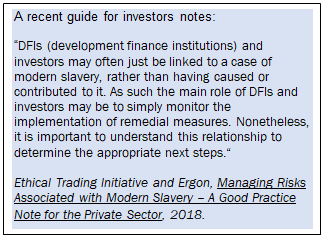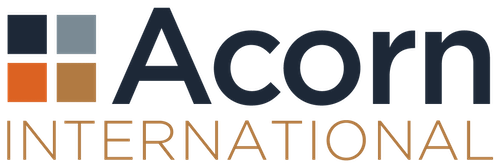ISSUE NO. 8: FAIR LABOR PRACTICES IN THE SUPPLY CHAIN – HOW FAR DOWN DO YOUR RESPONSIBILITIES EXTEND?
The 2nd in a series of Acorn International posts on Lessons from the Field – Practical Challenges to Applying International Standards and Good Practices for Human Rights.
International industries and financiers are facing increased pressure from their stockholders, boards and investors to manage human rights, and specifically fair labor practices, in their supply chains. Supporting this trend, financial institutions and regulators are issuing standards, guidelines and legislation to formalize and support these increasing expectations. Leading companies in the electronics, apparel and food industries have already put systems in place to audit and improve their suppliers’ labor practices.
As expectations grow and a broader range of industries and investors strive to understand and manage their responsibilities, many want to know: how far into the supply chain does our responsibility for ensuring fair labor conditions extend? More specifically:
- In assuring a company’s supply chain is free of unfair labor practices, does the company need to look beyond its primary suppliers to second or third level suppliers?
- And whether or not required to do so by international guidance or emerging legislation, are there circumstances in which companies would be wise to at least understand, if not actively manage, fair labor risks beyond primary suppliers?
This summary looks at four sources of guidance that help answer these questions:
- The International Finance Corporation’s (IFC) Performance Standard 2 Guidance Notes,
- IFC’s subsequent guidance on modern slavery and assessing risks in the supply chain,
- The Organisation for Economic Co-operation and Development’s (OECD) Responsible Business Conduct Due Diligence Guidance, and
- Recent legislation in the US, UK and Australia.
IFC’s Performance Standard 2 – Labor and Working Conditions
The objective of Performance Standard 2 is “to protect workers, including vulnerable categories of workers such as children, migrant workers, workers engaged by third parties, and workers in the client’s supply chain” by identifying, assessing, documenting and monitoring risks from their primary (first level) suppliers. Guidance Notes provided for this performance standard state: “Where there is a high risk of child labor or forced labor in the primary supply chain, the client will identify those risks.” and clarify that the level of responsibility for risks beyond its company-owned operations are “subject to the client’s level of management control or leverage over its supply chain.”
Continuing, IFC’s notes clarify that the expectations apply to the primary supply chain, defined as “to those suppliers who are providing goods, and materials essential for the core business processes of the project.” The guidance directs each financed client to “monitor its primary supply chain on an ongoing basis in order to identify any significant changes in its supply chain and if new risks or incidents of child and/or forced labor are identified, the client will take appropriate steps to remedy them.“
To help clarify where companies may be considered to have leverage over supply chains, IFC defines that “Leverage is the ability of the company to effect change in the practices of its supplier or subsequent upstream supply chain. It provides examples of conditions under which companies may have significant leverage on both the buy and sell sides:
Buyer influence makes it easier to incentivize changes in the practices of the supplier.
Such influence is indicated by:
-
-
- Large volumes purchased;
- few dominant buyers and many producers; and
- the ability to source the same product elsewhere (high substitutability).
-
Supplier influence makes it more difficult to influence changes in the practices of a supplier. Such influence is indicated by:
-
- Large volumes supplied;
- few dominant suppliers and many buyers; and
- restricted ability to source the same product elsewhere (high product specificity).”
Other IFC Guidance and Experience
IFC’s 2013 guidance document “Assessing and Managing Environmental and Social Risks in an Agro-Commodity Supply Chain” provides further clarification for looking at labor risks within these often complex and far-reaching networks of integrated providers. They also present broader expectations for client responsibilities extending into primary (source material) production where there are typically greater labor (and environmental and social) management risks. This guidance states that a client’s responsibilities extend to supply chain operations and activities over which it “can reasonably exercise control.”
Defining the extent to which one may be expected to “reasonably exercise control” can be difficult. Some companies have applied the test of having operational control over activities (for example chicken farmers and truck drivers who are applying company procedures). Others have stated that if the military or government agencies, or state-run enterprises dictate the terms under which they operate, the company does not have operational control and thus has little if any responsibility regarding the labor management practices of its contractors and suppliers.
 In Acorn International’s experience of working with IFC and its clients to determine the extent of responsibility for fair labor practices in the supply chain, we have found that the question is sometimes resolved by applying the same test as determining “associated facilities” under IFC Performance Standard 1. That is, if a supplier is so dependent on a company’s presence and activity that it would not otherwise be able to viably maintain business operations in the region without the company’s business, then this company can be considered to “reasonably exercise control” and therefore have some responsibility for assuring fair labor management by the supplier.
In Acorn International’s experience of working with IFC and its clients to determine the extent of responsibility for fair labor practices in the supply chain, we have found that the question is sometimes resolved by applying the same test as determining “associated facilities” under IFC Performance Standard 1. That is, if a supplier is so dependent on a company’s presence and activity that it would not otherwise be able to viably maintain business operations in the region without the company’s business, then this company can be considered to “reasonably exercise control” and therefore have some responsibility for assuring fair labor management by the supplier.
OECD
The OECD takes a different approach to defining responsibilities for managing labor and other ESG risks in its 2011 “Due Diligence Guidance for Responsible Supply Chains of Minerals from Conflict-Affected and High-Risk Areas1” Rather than provide guidance on under what circumstances companies may have responsibility for different levels of their supply chain, OECD calls on signatories to its due diligence guidance for Responsible Business Conduct (RBC) to commit not to benefit by any means from parties or activities that employ forced labor or other human rights abuses when operating in high risk areas. The Guidance states a commitment that “While sourcing from, or operating in, conflict-affected and high-risk areas, we will neither tolerate nor by any means profit from, contribute to, assist with or facilitate the commission by any party of: any forms of forced or compulsory labour, which means work or service which is exacted from any person under the menace of penalty and for which said person has not offered himself voluntarily” along with other violations of international humanitarian law.
The Guidance proceeds to commit signatories to “immediately suspend or discontinue engagement with upstream suppliers where we identify a reasonable risk that they are sourcing from, or linked to, any party committing serious abuses as defined in (the paragraph above).” Many of the world’s largest commercial and investment banks have committed to apply OECD’s RBC guidance, meaning that they are relevant to a wide range of operations and investments worldwide.
Legislation
The International Labor Organization (ILO) has issued a number of conventions with expectations for protecting and respecting human rights in the labor force and supply chain. As these conventions are adopted by signatory countries, they become part of the body of requirements that may be imposed on companies operating within the signatories’ jurisdictions.
Certain governments are going beyond the ILO conventions to enact their own legislation to require, or being used by third parties to require, fair labor practices among companies operating within their jurisdictions. Examples from the US, UK and Australia stand out2.
The California Transparency in Supply Chains Act of 2010 promotes broader corporate responsibility for ensuring fair labor practices in their supply chains. The law requires any company selling or manufacturing goods and/or services in California and having annual worldwide gross receipts that exceed $100 million to disclose its efforts to eradicate slavery and human trafficking from its direct supply chain for tangible goods offered for sale.
Earlier this year, lawsuits were filed under Massachusetts’ Consumer Protection Law to hold companies liable for not disclosing slave labor practices within their supply chains. The lawsuits allege that companies selling chocolate and cocoa misled consumers by not disclosing the existence of child and slave labor in their supply chains. These legal actions focus on company CSR, sustainability and human rights statements that make claims for ‘zero tolerance’ of child labor, despite studies that have publicly cited instances of such labor in the countries where these companies purchase key commodities.
The United Kingdom Modern Slavery Act (2015) addresses direct versus indirect supplier responsibilities more succinctly. The government’s 2017 Practical Guide notes that companies with UK business activities and total annual ‘turnover of over ₤36m3’ must annually produce a slavery and human trafficking statement that sets out the steps the company has taken to ensure modern slavery is not taking place in their supply chain. While this does not mean that the company must guarantee its business operations (direct and indirect) to be ‘slavery free4‘, it must indicate steps taken to ensure that slavery and human trafficking is not taking place in ‘any (emphasis added) of its supply chains, and in any part of its own business.’
A Modern Slavery Bill was introduced to the Australia Parliament on June 28 of 2018 The legislation is modeled on the UK Modern Slavery Act5, in that it will require companies operating in Australia with annual revenues over AUD 100m to report annually on efforts to address modern slavery in their operations and supply chains. The legislation has already been criticized as unlikely to be enforceable because it does not include provisions for non-compliance penalties. Indeed, compliance with the UK Modern Slavery Act has been limited, with only half of the threshold companies actually reporting.
Looking Forward
As consumer, employee, shareholder and financier demands for assurance of fair labor practices in the supply chain continue to grow, industries and investors will need to strengthen their systems for reliably assessing and responsibly managing their suppliers’ practices. Making sustainable decisions as to how far into the supply chain that responsibility should extend will be a critical challenge in assuring the success of such systems and defining a company’s liability in the eyes of its most important stakeholders.
None of the legislative instruments referenced above provides specific guidance on at what point in the supply chain a company’s responsibility stops, but companies operating in these jurisdictions should pay close attention to others’ experiences as the laws continue to be applied in operations and tested in the courts. Likewise, emerging experience in applying international guidance on fair labor practices is providing important lessons on how concepts such as leverage, control and benefit may be appropriate delineators for determining how far into the supply chain one’s responsibility for assuring fair labor practices extends. International industries and investors will be well-served to have made these determinations as part of common practice to ensure they are meeting emerging demands for responsible supply chain management efficiently, consistently and defensibly.
1 The third edition of this OECD publication was released in 2016, and can be found at http://www.oecd.org/daf/inv/mne/OECD-Due-Diligence-Guidance-Minerals-Edition3.pdf
2 France and the Netherlands have also passed similar legislation. For more information see https://www.ft.com/content/397bcdf6-3bb7-11e7-ac89-b01cc67cfeec
3 This turnover is to include that of subsidiaries operating outside the UK.
4 UK Modern Slavery Act, Transparency in Supply Chains, A Practical Guide, 2017 accessed at https://assets.publishing.service.gov.uk/government/uploads/system/uploads/attachment_data/file/649906/Transparency_in_Supply_Chains_A_Practical_Guide_2017.pdf
News & Notes

Acorn International
1702 Taylor St, Suite 200B
Houston, TX 77007, USA
1213 Purchase St
New Bedford, MA 02740, USA
